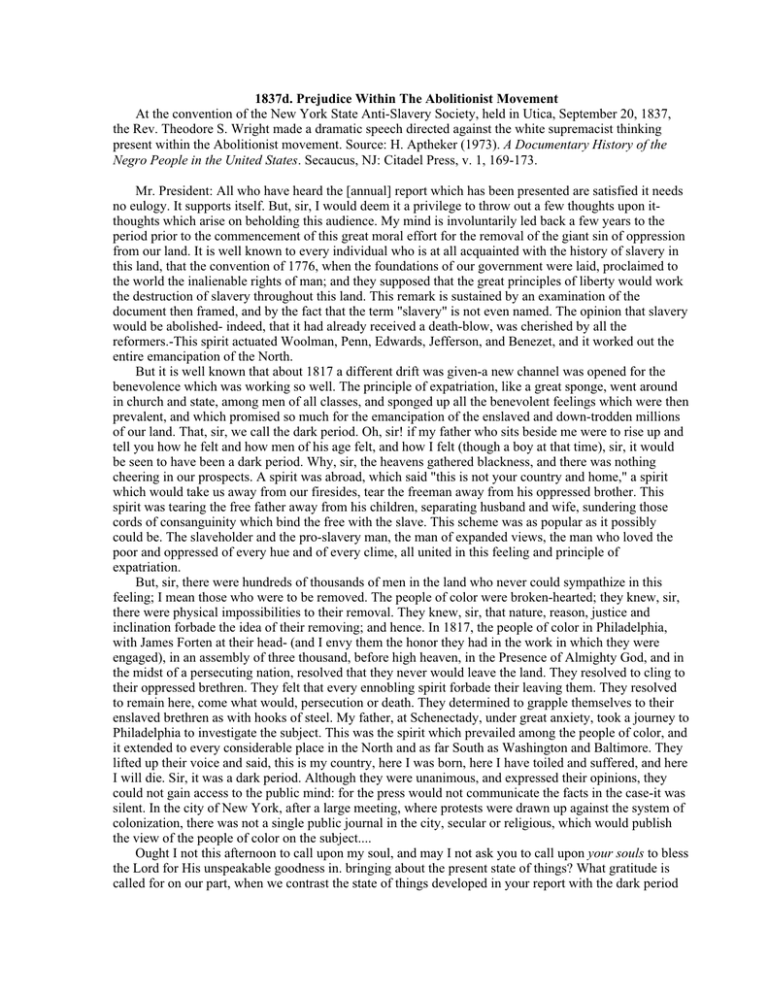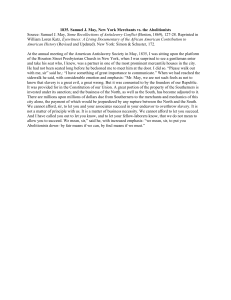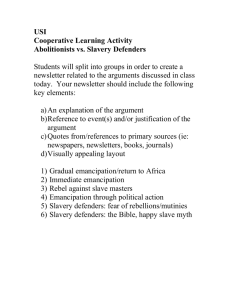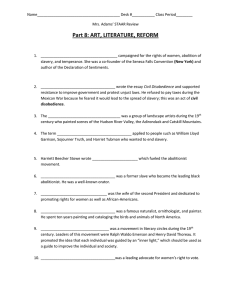1837d. Prejudice Within The Abolitionist Movement
advertisement

1837d. Prejudice Within The Abolitionist Movement At the convention of the New York State Anti-Slavery Society, held in Utica, September 20, 1837, the Rev. Theodore S. Wright made a dramatic speech directed against the white supremacist thinking present within the Abolitionist movement. Source: H. Aptheker (1973). A Documentary History of the Negro People in the United States. Secaucus, NJ: Citadel Press, v. 1, 169-173. Mr. President: All who have heard the [annual] report which has been presented are satisfied it needs no eulogy. It supports itself. But, sir, I would deem it a privilege to throw out a few thoughts upon itthoughts which arise on beholding this audience. My mind is involuntarily led back a few years to the period prior to the commencement of this great moral effort for the removal of the giant sin of oppression from our land. It is well known to every individual who is at all acquainted with the history of slavery in this land, that the convention of 1776, when the foundations of our government were laid, proclaimed to the world the inalienable rights of man; and they supposed that the great principles of liberty would work the destruction of slavery throughout this land. This remark is sustained by an examination of the document then framed, and by the fact that the term "slavery" is not even named. The opinion that slavery would be abolished- indeed, that it had already received a death-blow, was cherished by all the reformers.-This spirit actuated Woolman, Penn, Edwards, Jefferson, and Benezet, and it worked out the entire emancipation of the North. But it is well known that about 1817 a different drift was given-a new channel was opened for the benevolence which was working so well. The principle of expatriation, like a great sponge, went around in church and state, among men of all classes, and sponged up all the benevolent feelings which were then prevalent, and which promised so much for the emancipation of the enslaved and down-trodden millions of our land. That, sir, we call the dark period. Oh, sir! if my father who sits beside me were to rise up and tell you how he felt and how men of his age felt, and how I felt (though a boy at that time), sir, it would be seen to have been a dark period. Why, sir, the heavens gathered blackness, and there was nothing cheering in our prospects. A spirit was abroad, which said "this is not your country and home," a spirit which would take us away from our firesides, tear the freeman away from his oppressed brother. This spirit was tearing the free father away from his children, separating husband and wife, sundering those cords of consanguinity which bind the free with the slave. This scheme was as popular as it possibly could be. The slaveholder and the pro-slavery man, the man of expanded views, the man who loved the poor and oppressed of every hue and of every clime, all united in this feeling and principle of expatriation. But, sir, there were hundreds of thousands of men in the land who never could sympathize in this feeling; I mean those who were to be removed. The people of color were broken-hearted; they knew, sir, there were physical impossibilities to their removal. They knew, sir, that nature, reason, justice and inclination forbade the idea of their removing; and hence. In 1817, the people of color in Philadelphia, with James Forten at their head- (and I envy them the honor they had in the work in which they were engaged), in an assembly of three thousand, before high heaven, in the Presence of Almighty God, and in the midst of a persecuting nation, resolved that they never would leave the land. They resolved to cling to their oppressed brethren. They felt that every ennobling spirit forbade their leaving them. They resolved to remain here, come what would, persecution or death. They determined to grapple themselves to their enslaved brethren as with hooks of steel. My father, at Schenectady, under great anxiety, took a journey to Philadelphia to investigate the subject. This was the spirit which prevailed among the people of color, and it extended to every considerable place in the North and as far South as Washington and Baltimore. They lifted up their voice and said, this is my country, here I was born, here I have toiled and suffered, and here I will die. Sir, it was a dark period. Although they were unanimous, and expressed their opinions, they could not gain access to the public mind: for the press would not communicate the facts in the case-it was silent. In the city of New York, after a large meeting, where protests were drawn up against the system of colonization, there was not a single public journal in the city, secular or religious, which would publish the view of the people of color on the subject.... Ought I not this afternoon to call upon my soul, and may I not ask you to call upon your souls to bless the Lord for His unspeakable goodness in. bringing about the present state of things? What gratitude is called for on our part, when we contrast the state of things developed in your report with the dark period when we could number the Abolitionists, when they were few and far between? Now a thousand societies exist, and there are hundreds of thousands of members. Praise God and persevere in this great work. Should we not be encouraged? We have everything to hope for, and nothing to fear. God is at the helm. The Bible is your platform-the Holy Spirit will aid you. We have everything necessary pledged, because God is with us. Hath he not said-"Break every yoke, undo the heavy burdens, and let the oppressed go free"?-"Remember them that are in bonds, as bound with them"? Why do I see so many who minister at the sacred altar- so many who have everything to lose and nothing to gain, personally, by identifying themselves with this cause? Nothing but the spirit of Almighty God brought these men here. This cause, noble though persecuted, has a lodgment in the piety of our countrymen, and never can be expatriated. How manifest has been the progress of this cause! Why, sir, three years ago, nothing was more opprobious than to be called an "Abolitionist" or "antislavery man"! Now you would be considered as uncharitable towards pro-slavery men, whether editors of newspapers, presidents of colleges or theological seminaries, if you advance the idea that they are not Abolitionists or antislavery men. Three years ago, when a man professed to be an Abolitionist, we knew where he was. He was an individual who recognized the identity of the human family. Now a man may call himself an Abolitionist and we know not where to find him. Your tests are taken away. A rush is made into the abolition ranks. Free discussion, petition Anti-Texas, and political favor converts are multiplying. Many throw themselves in, without understanding the breadth and depth of the principles of emancipation. I fear not the annexation of Texas. I fear not all the machination, calumny and opposition of slaveholders, when contrasted with the annexation of men whose hearts have not been deeply imbued with these high and holy principles. Why, sir, unless men come out and take their stand on the principle of recognizing man as man, I tremble for the ark, and I fear our society will become like the expatriation society; everybody an Abolitionist. These points which have lain in the dark must be brought out to view. The identity of the human family, the principle of recognizing all men as brethren-that is the doctrine, that is the point which touches the quick of the community. It is an easy thing to ask about the vileness of slavery at the South, but to call the dark man a brother, heartily to embrace the doctrine advanced in the second article of the constitution, to treat all men according to their moral worth, to treat the man of color in all circumstances as a man and brother that is the test. Every man who comes into this society ought to be catechized. It should be ascertained whether he looks upon man as man, all of one blood and one family. A healthful atmosphere must be created, in which the slave may live when rescued from the horrors of slavery. I am sensible I am detaining you, but I feel that this is an important point. I am alarmed sometimes when I look at the constitutions of our societies. I am afraid that brethren sometimes endeavor so to form the constitutions of societies that they will be popular. I have seen constitutions of abolition societies, where nothing was said about the improvement of the man of color! They have overlooked the giant sin of prejudice. They have passed by this foul monster, which is at once the parent and offspring of slavery. Whilst you are thinking about the annexation of Texas-whilst you are discussing the great principles involved in this noble cause, remember this prejudice must be killed or slavery will never be abolished. Abolitionists must annihilate in their own bosoms the cord of caste. We must be consistent-recognize the colored man in every respect as a man and brother. In doing this we shall have to encounter scorn. we shall have to breast the storm. This society would do well to spend a whole day in thinking about it and praying over it. Every Abolitionist would do well to spend a day in fasting and prayer over it and in looking at his own heart. Far be it from me to condemn Abolitionists. I rejoice and bless God for this first institution which has combined its energies for the overthrow of this heaven-daring-this soul-crushing prejudice. The successors of Penn, Franklin and Woolman have shown themselves the friends of the colored race. They have done more in this cause than any other church and they are still doing great things both in Europe and America. I was taught in childhood to remember the man of the broad- brimmed hat and drabcolored coat and venerate him. No class have testified more to the truth on this subject. They lifted up their voices against slavery and the slave-trade. But, ah! with but here and there a noble exception, they go but halfway. When they come to the grand doctrine, to lay the ax right down at the root of the tree, and destroy the very spirit of slavery- there they are defective. Their doctrine is to set the slave free, and let him take care of himself. Hence, we hear nothing about their being brought into the Friends' Church, or of their being viewed and treated according to their moral worth. Our hearts have recently been gladdened by an address of the Annual Meeting of the Friends' Society in the city of New York, in which they insist upon the doctrine of immediate emancipation. But that very good man who signed the document as the organ of that society within the past year, received a man of color, a Presbyterian minister, into his house, gave him his meals alone in the kitchen, and did not introduce him to his family. That shows how men can testify against slavery at the South, and not assail it at the North, where it is tangible. Here is something for Abolitionists to do. What can the friends of emancipation effect while the spirit of slavery is so fearfully prevalent? Let every man take his stand, I burn out this prejudice, live it down, talk it down, everywhere consider the colored man as a man, in the church, the stage, the steamboat, the public house, in all places, and the death-blow to slavery will be struck. The Colored American (N.Y.), October 4, 1837; published in C. G. Woodson, ed., Negro Orators, pp. 8692.





